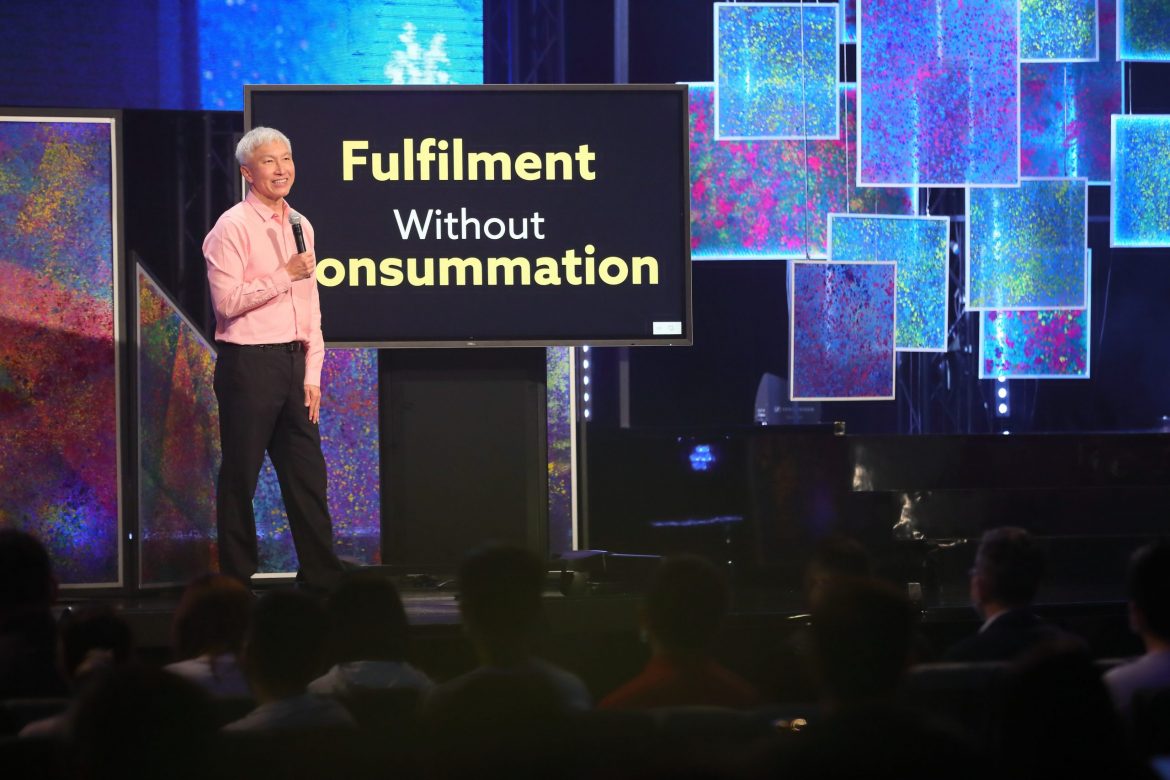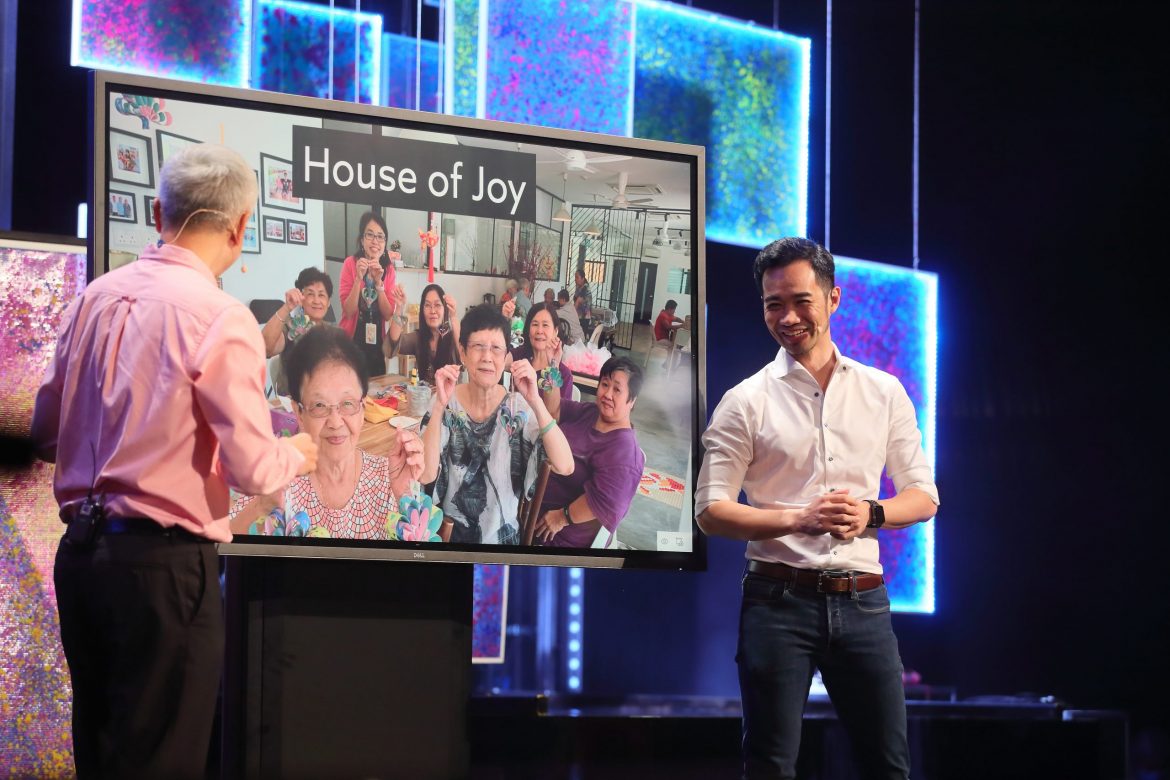In his final sermon on the Kingdom of God, Kong Hee unpacked the mystery of the Kingdom through seven parables in Matthew. Each offers a glimpse into the Kingdom of God that is here and that which is to come.
In his sermon on the weekend of Sep 25 and 26, Kong Hee, senior pastor of City Harvest Church expounded on the mystery that Jesus spoke of in Mark 4:11, the mystery of the Kingdom of God had been given to them.

Pastor Kong explained that the Jews believe that at the coming of the Kingdom of God, God will rule in power and glory over all the nations. They believe that in this singular event, all wickedness, injustice and suffering will be dispelled.
“However, when Jesus came, He said that God’s plan and timetable are not like that,” he said. “This is the mystery of the Kingdom. There are two events, not one.”
The Kingdom came when Jesus was born, but it will only appear in its full power and glory at His second coming. “In short, it is fulfilment without consummation. The promises of the Old Testament have already been fulfilled. The Kingdom of God is already here. But for now, it is working quietly, secretly within us,” Pastor Kong said. “Everyone who is in Christ will experience the blessing of the Kingdom—but not in its fullness, as the power and glory have not yet fully manifested.”
Hence, Jesus was explaining that those who follow Him are able to understand the Kingdom of God through experiencing it within themselves. On the other hand, for “those on the outside” (Mk 4:11), these truths are concealed within parables.
COMMON MISCONCEPTIONS ABOUT PARABLES
To understand parables as they were intended, Pastor Kong clarified two key things. One, parables are not to be confused with allegories. Parables convey a single truth, while allegories are open for interpretation on many points and levels.
To illustrate this, Pastor Kong gave the example of the Parable of the Good Samaritan. The truth that Jesus was attempting to clarify was: Who is our neighbour? “All the details in this story are merely meant to add local flavour and colour,” he explained. Pastor Kong cautioned the congregation to fixate on the details in a parable—to do so would be a gross deviation from the main message.
Two, Jesus did not use everyday examples to make clear the truth to everyone, as is commonly believed. Instead, parables are meant to conceal the truth from the arrogant and those who are spiritually dull, in a manner where they may “see and not perceive” and “hear and not understand”. In contrast, those whose hearts are in tune with God’s will have underlying truths revealed to them.
7 PARABLES ABOUT THE KINGDOM OF GOD
In the Parable of the Sower, seeds were sown on four different kinds of soil. Only those that fell on good soil were fruitful, bearing a harvest. Those that fell on the wayside, stony soil and thorny ground bore no fruit. This parable explains that the truth of the Kingdom of God will be received by some but rejected by others. “The degree of your Kingdom experience is dependent on your responsiveness. God works quietly and secretly among us, but He doesn’t force Himself upon any of us,” Pastor Kong elaborated.

The second parable is the Parable of the Wheat and the Tares. Seeds were sown in the field, which refers to the world. Both the good wheat and bad tares will grow until the harvest, at which the farmer will gather the tares and destroy them in the furnace. This parable teaches that both the righteous and the wicked will co-exist in the world until Jesus’ Second Coming, and then a distinct and eternal separation will take place. Yet, until then, Christians are not meant to withdraw from the world but to shine as salt and light on the earth.
Thirdly, the Parable of the Mustard Seed likens the Kingdom of God to a tiny mustard seed. While it will one day become a very great tree, it is easy to overlook at the start because it seemed small and insignificant. Through this parable, Jesus teaches not to despise the small beginnings of the Kingdom for it has all the power within itself to accomplish its task. Undoubtedly, it will one day become a blessing to many.
The Parable of the Leaven compares the Kingdom of God to yeast. The underlying message is that no one can stop the sovereignty of God. A little leaven in an entire mass of flour will still work through the entire pot, transforming the whole dough. To those around Jesus, it was difficult to imagine that Jesus’ ministry would amount to much. Yet, no one can stop the far-reaching transformative effects of the Kingdom of God once it has been established.
The fifth and sixth parables are the Parable of the Hidden Treasure and the Parable of the Pearl. In the former, a man found a great treasure hidden in the field. He loved the treasure so much that he went and sold everything he had to buy the entire field to obtain the treasure. The latter describes a merchant who found a precious pearl that he prized so much that he sold everything to attain it.
“One truth in these two parables is this: you must be willing to follow Jesus Christ at any cost. The Kingdom of God is so precious, is more precious than all your worldly, earthly possessions,” the pastor explained. “Jesus’ main point is that being a disciple of Jesus Christ is worth every sacrifice you make because only a disciple can gain the Kingdom of God.”
The final parable is the Parable of the Dragnet. The net is dragged through the sea, catching all kinds of fish. The catch is then being sorted out, separating the good fish from the bad, before those bad ones are discarded. While similar to the Parable of the Wheat and the Tares, this parable refers not to a separation on the world, but within the community of faith.
These seven parables explain the Kingdom of God: it is supernatural, a gift from God that money cannot buy. For it to be effective, one must receive it with an open heart like good ground receiving the seed. The Kingdom of God has already come into this world, but the righteous and the wicked will only be separated when Jesus comes again. It may seem insignificant now, but like leaven, it will one day fill the whole earth, and nothing can stop it.
To experience the reality of God’s Kingdom, a disciple must make the radical decision to follow Jesus, Pastor Kong reiterated. This decision necessitates mental, emotional and spiritual preparation as illustrated by three individuals who encountered Jesus (Lk 9:57-62)
The first was a man who was mentally unprepared to follow Jesus. He told Jesus that he wanted to follow Him. Jesus replied to him saying, “Foxes have holes and birds of the air have nests, but the Son of Man has nowhere to lay His head” (Lk 9:58), which was to challenge the seriousness of his decision. “God wants you to make a decision, but it must be a considered decision,” Pastor Kong explained. Ultimately, this man did not follow Jesus. It is likely that at Jesus’ prompting, the realisation of the true cost of discipleship made the man realised that he was ill-prepared to become a disciple.
Next, was a man who was emotionally unprepared to follow Jesus. When Jesus called out to him, the man wanted to first go and bury his father, which meant that he had other affairs to deal with. While he wanted to follow Jesus, his heart was not ready.
The last man was spiritually unprepared to become Jesus’ disciple. While he expressed interest in following Jesus, he requested to bid his family goodbye first. Jesus replied, “No one who puts a hand to the plow and looks back is fit for service in the Kingdom of God” (Lk 9:62). This was a man who wanted to follow Jesus on his own terms.
“If you want to respond to the Kingdom of God, there must be no hesitation, no looking back. You must be prepared to go all the way,” Pastor Kong exhorted.
CHURCH WITHOUT WALLS
In the next segment, Pastor Kong brought Kenny Low on stage to share about the works of City Harvest Community Services Association (CHCSA), a key example of bringing the Kingdom of God to the world. Headed by Kenny, CHCSA has been meeting needs in the community for 25 years. Its current works include the House of Joy, which is a drop-in centre for senior citizens in two locations, Mountbatten and Tampines. The activities at HOJ serve to bring life, joy and dignity to the elderly. CHCSA also serves the youth and families in need.

The final two Church Without Walls initiatives were unveiled to the congregation. CityOutlook, helmed by Pastor Teo Meng How, helps low-income or single-parent families by refurbishing their homes. Even small improvements to the home can greatly uplift a whole family’s outlook on life, as experienced firsthand by a mother-son pair whose home was CityOutlook’s inaugural project.
Next, the congregation heard the testimony of Amos Koh and Belle Mah. At a young age, Amos lacked parental guidance and fell into gangs. During his second stint in prison, Amos came to accept Christ through an inexplicable decision by a prison warden to invite Amos to a Christmas event. During an encounter with God, Amos was reminded of his first encounter with the Lord at age 11, when he was invited by his form teacher to attend City Harvest Church. After accepting the Lord, Amos started to read the Bible daily and determined to cut off all ties with his former gang members. Now, he is happily married Belle, and they have a four-year-old daughter and is blessed to be doing well in his career.
This segued into the introduction of the final CWW initiative, Prison Care Ministry, headed by Eric Soo. It aims to rebuild the lives of ex-offenders, to help them reconcile with their family members and re-integrate back into society.
If you wish to be part of Church Without Walls, please contact your cell group leader or sign up via www.chc.org.sg/cww.
